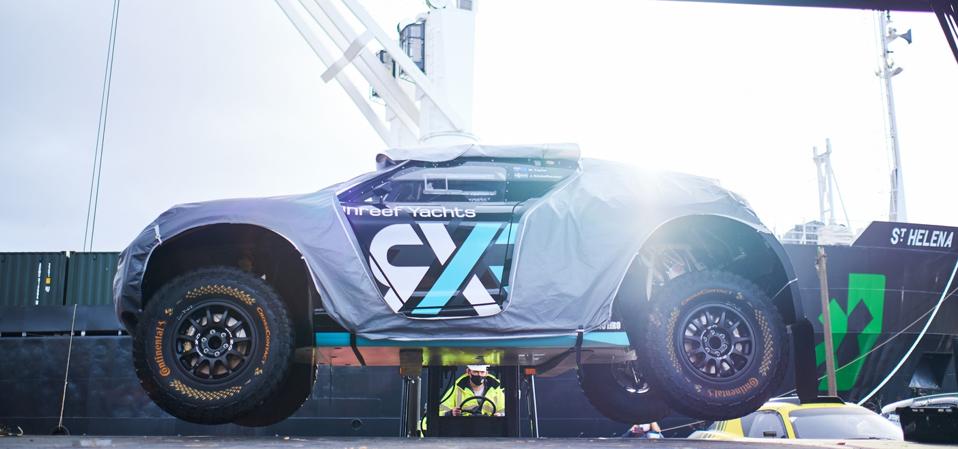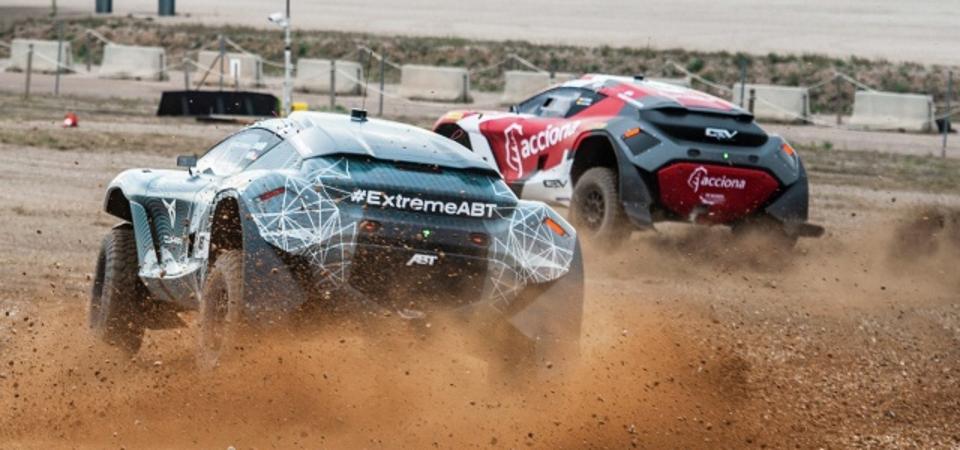The Extreme E’s St Helena may be the coolest cargoship in the World
I love Monaco. I love superyachts. And best of all, I love all the excitement, glamor, history and royalty that happens when the Monaco Grand Prix will take place (hopefully!) in May.
However, I’m also passionate about environmental conservation and I especially love when a focused group of people use innovative ideas to tackle some of our globe biggest challenges.
So, when I first heard about the radical new Extreme E racing series that features electric SUVs racing in extreme environments around the world which have already been damaged or affected by climate and environmental issues, I was intrigued.

Nico Rosberg’s Extreme E electric race car is precious cargo aboard the Extreme E cargo ship St … [+]
But now that I’ve learned that this exciting series uses an innovative ship the St. Helena (in addition to zero emissions racecars!) to stage environmentally friendly races in remote locations. And Extreme E is also pioneering hydrogen fuel cell technology which will enable its race fleet to be charged using zero emission energy. I’m convinced this could be a very special series.
And the fact that whole concept centers on The St. Helena, a former passenger cargo ship that has undergone a multi-million dollar refit to minimize emissions and transform her into Extreme E’s operations hub is pure genius.

Extreme E race teams will compete in 5 races around the world this year
The St. Helena that was specifically designed to transport everything the series needs—including the vehicles and infrastructure— to minimize Extreme E’s footprint, as well facilitate scientific research through its on-board laboratory was just departed the UK for the first race in the series.
And the moment was celebrated by Extreme E Founder and CEO Alejandro Agag who sprayed a celebratory bottle of Moët champagne to toast the start of her new journey. “Today I feel extremely proud.” Agag said. “The departure of the St. Helena marks the start of her new voyage. Extreme E’s first season is now officially underway.

Extreme E Alejandro Agag, Founder and CEO celebrates the launch of the St Helena.
The ex-Royal Mail Ship which had been the lifeline to the island of St. Helena, has been under Extreme E’s stewardship for more than two years and undergone a comprehensive mechanical overhaul.
“I have always had a love for the ocean, which was inspired by documentaries featuring the French biologist, Jacques Cousteau,” Agag continues. “He made me dream because he had a boat, he had the Calypso, and my dream is that the St. Helena becomes the new Calypso of the 21st century.”

Extreme E Preseason Testing
Instead of the carrying the Royal Mail, the St Helena’s cargo is now comprised of: a fleet of state-of-the-art electric race vehicles, tires, team garages, the podium, the start gantry, TV and broadcast equipment, three machines from 3devo to turn plastic waste into the championship’s trophies, two custom BRIG Eagle 8 carbon black support boats, a hydrogen fuel cell for zero-emission car charging created in collaboration with AFC Energy, plus a variety of Bosch tools.

The race series full-electric cars will be zero emission charged thanks to AFCEnergy’s hydrogen fuel … [+]
In addition, Extreme E in cooperation with Enel Foundation, the championship’s Founding Scientific Partner has invited scientists to apply for space on the ship to conduct research connected to advancing climate science in its on board laboratory during the voyage. In total, seven projects managed by 14 scientists have been selected to join the voyage. The seven projects will each focus on a different area of ocean research, with full details to be announced in the coming weeks.
Meanwhile the St. Helena is sailing through the Mediterranean to Saudi Arabia, where it is expected to arrive after 17 to 20 days. After Saudi Arabia, she will go back through the Mediterranean to Senegal, across to Greenland, down to the Amazon and then further south to the final destination of the season in Tierra del Fuego, Argentine Patagonia.
Watch this space!
Source link



